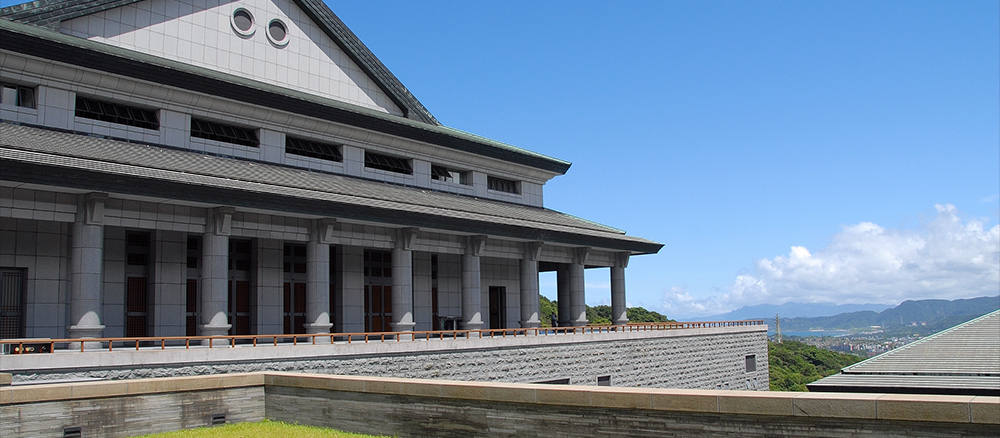About DDM
Interfaith
Promoting religious cooperation to bring peace and well-being to humanity
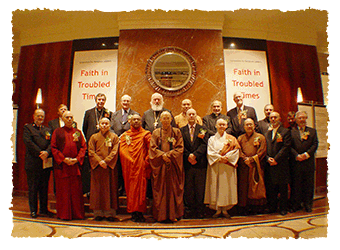
If we wish to share our religious faith and concepts with all of humanity, the best way is to practice tolerance, respect, and help those who differ from us. We should apply wisdom and compassion to help settle conflicts and wars waged between various ethnic groups, settling disputes through wisdom and reaching out to different ethnic groups with compassion. We should bring love and method to resolve conflict among religions and discrimination among races, rather than replacing their original faiths with the religion we believe in.
If we can base mutual cooperation among religions on the principle of respecting all other religions, then people will be able to coexist peacefully. This is particularly pertinent, living in a modern, global environment with multiple religions. As soon as we set foot outside the borders of our own country, step outside our own ethnic group, or even when we leave our own homes, we will come into contact with people belonging to different religions. In an open society we may even encounter different religious faiths being practiced by spouses and children within one nuclear family. We have to show respect and appreciation in support of each other's choices. We should not subjectively criticize or comment on someone else's religious faith, but instead we must help each other and cooperate to create a harmonious, peaceful, happy, and heart-warming living environment.
This so-called cooperation does not necessarily have to operate within one and the same organization. For example, in response to each other we give up violence, cast away past enmity, and cease to settle old scores, but instead work together to put an end to the root causes of hunger, disease, natural disasters, and racial warfare, and to help preserve our environment and the Earth's resources for future generations. In addition we may cooperate in protecting humanity's hearts and minds from pollution caused by feelings of hatred, greed, jealousy, anger, pride, low self-esteem, hesitation, fear, worry, self-delusion, arrogance, and loss.
If each religion starts by influencing and encouraging their own followers, then all major religions in all the countries around the world will be able to exercise influence on its people, politicians and industrial and business entrepreneurs. If all of us could share such a common ethos, that would signify the first big step in interfaith cooperation.
Chan Practice
A Home for Chan Practice
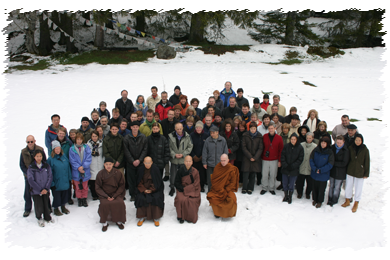
As Master Sheng Yen traveled more and more frequently to many places around the world to give guidance in Chan practice, one by one his Chinese and English works were translated into more than ten languages, and more and more people would think nothing of traveling from all corners of the world to attend his seven-day retreats. Due to a lack of space at the Chan Meditation Center, in July 1997 the Dharma Drum Retreat Center was established as purpose-built international center for Chan practice.
The Dharma Drum Retreat Center, which is mainly used for long-term Chan practice activities, is surrounded by nature. The beautiful scenery, in all its tranquility and seclusion lends itself to practicing Chan meditation. In 1998 Master Sheng Yen led two seven-day Chan retreats there applying the methods of silent illumination and Huatou, this being his first attempt to give intensive guidance in one specific Dharma method. During the period from May 6 to June 24 of 2000, a further “49-day silent illumination retreat” was held at the center, attracting attention far and wide. Due to space limitations, only sixty applicants were accepted, coming from thirteen countries: the United States, United Kingdom, France, Portugal, Israel, Poland, Saudi Arabia, Croatia, Mexico, Australia, Canada, Malaysia, and Singapore. The simple, practical Chan methods that Master Sheng Yen taught have obviously transcended the barriers of race, culture, and religion, and are widely accepted by Chan practitioners around the globe. In order to enable more people to benefit from the Dharma, a pair of additional two-story dormitories was built at the Dharma Drum Retreat Center in 2003, so currently it can accommodate over one hundred people on a seven-day retreat at the same time.
The “49-day silent illumination retreat” was the first of its kind ever in the twenty years since Master Sheng Yen had begun teaching Chan practice. It not only established a template for conducting long-term Chan retreats, but also established a complete framework for spiritual practice, laying the foundations for holding a “49-day Huatou retreat” at the DDM World Center for Buddhist Education in 2007. With his long experience in guiding people in Chan practice, Master Sheng Yen became even more conversant in teaching Chan, employing his skills with great command and ease.
Peace Building
Global ethics and values
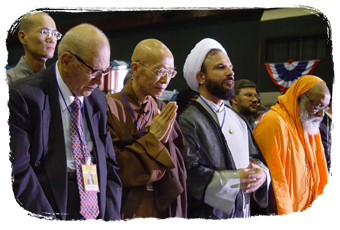
Every ethnic group has their own perspectives and standards to interpreting the concept of “justice”, and so this leads to contradiction and opposition among humanity, as everyone considers that they themselves are on the side of justice, with the opposition on the other side rooting for injustice. This happens when we cling to what we think is true and reject what we think is wrong. Today, therefore, we need to establish shared, global ethics, rather than insisting on the justice as identified by each respective group. We should be generous and tolerant with other people's faults, reach out to help every individual, interact with others in peace and harmony, and seek mutual growth.
What are global, shared ethical values? Respect for every being, acknowledging that every individual has the right to exist, and that each person has the responsibility to protect and cherish all others. If any ethnic group seeks to protect its own people by harming people from other ethnic groups, global ethics will not allow it. Once all of humanity can treat each living creature as they would their compatriots and siblings, and strive to develop respect and tolerance for each other, then there will be no more arguments on who is and who isn't on the side of justice.
Establishing a set of global, shared ethical values, serves not only to prevent and counter terrorist attacks, but also actively protect each individual within each ethnic group from suffering the threat of mutual harm, and to ensure that each individual on Earth will not be suspected, wronged, discriminated, denied, and attacked, besides enabling mutual respect, mutual consideration, mutual tolerance, mutual learning, and mutual help. This is the only way our world can enjoy universal and lasting peace.
Young People
Working towards World Peace
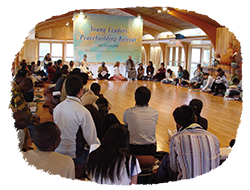
“Advancing World Peace” was the topic Master Sheng Yen taught at the youth activities. During those gatherings, young leaders from around the world from various cultural backgrounds would meet to come to understand the differences between them, identify issues of mutual concern, build a consensus, enhance opportunities for collaboration between races, men and women, and ethnic groups, thereby discovering a path for the youth to create world peace. In 2003, Master Sheng Yen attended the first preparatory meeting for the World Youth Peace Summit, held in Kyoto, Japan. Among the discussion topics were young people's health and well-being, the terms and definition of leadership, definition and views on peace, and violence and conflict. Promotional plans were also formulated, to invite youth leaders around the globe to join in the efforts to promote world peace.
In 2004, Master Sheng Yen led a delegation of six Taiwanese outstanding youth representatives to Bangkok to take part in the Asia Pacific World Youth Peace Summit, organized by the World Council of Religious Leaders, where they met over 700 outstanding young people from 39 countries, to discuss and propose plans for enhancing peace, and to establish a global collaborative network.
Under Master Sheng Yen's guidance, in recent years, Dharma Drum Mountain international and youth oriented Dharma sharing activities have become an important policy. Since the establishment of the Young People Development Department in 2005, Dharma Drum Mountain has also initiated international meetings. In 2006, Dharma Drum Mountain and the Global Peace Initiative of Women co-organized the Young Leaders Peace Council, held at the Dharma Drum Retreat Center, New York, which witnessed 75 young leaders from Europe, America, Asia, and Africa working together to enhance world peace. This was the first time Dharma Drum Mountain organized an international forum together with an international non-profit organization in the United States. After the event, the Master led 15 youth representatives to New York where they took part in the UN Global Youth Leadership Summit, opening up an opportunity for global collaboration and interaction.
In 2007 a group of monastics from the Dharma Drum Mountain Sangha and six young people participated in the Sudan Youth Peace Dialogue organized by Young Leaders Peace Council, which was held in Kenya, where a delegation of 40 young Sudanese people met with some twenty young people from Taiwan, the US, Japan, Lebanon, Nigeria, and Uganda to discuss solutions to the problems in Sudan caused by the Sudanese civil war. Although Master Sheng Yen was unable to be present at the Dialogue in person, through his opening remarks he urged the young people to face all problems in peace, and to seek ways of reconciliation, as the best path in facing conflict.
Except from: Digital Archive Dedicated to Master Sheng Yen http://www.shengyen.org/eng/

